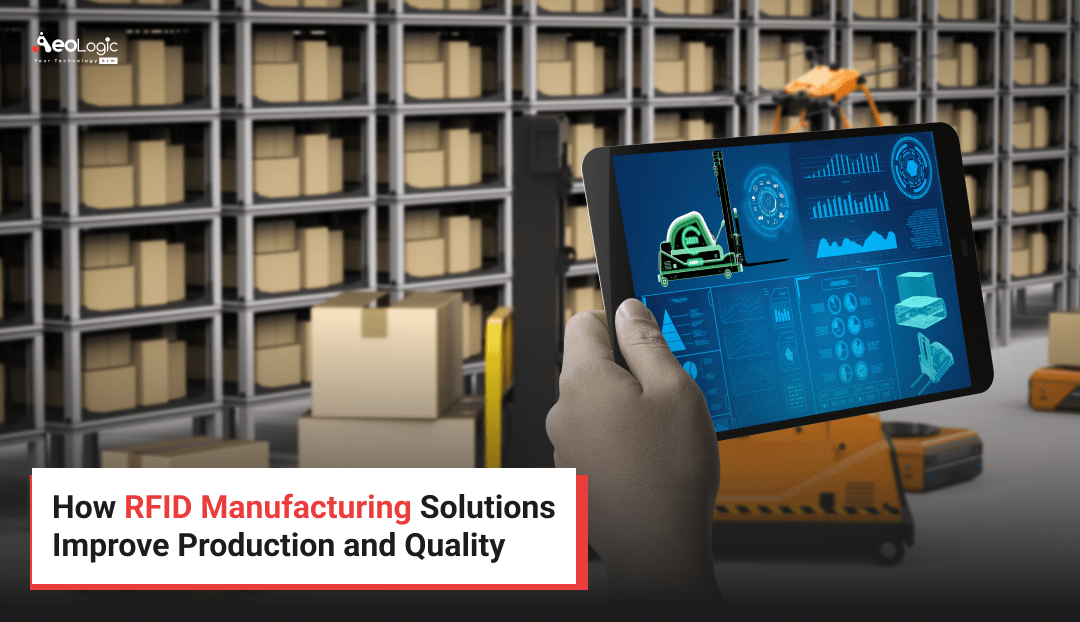Nowadays, RFID technology has various use cases that are applied by multiple industries. The manufacturing industry is also going through digital transformation, and RFID-powered solutions are playing a crucial role. Still, many manufacturers are facing problems like a low productivity, poor quality products, poor product tracking, and poor decision-making. The reason is that they have not implemented any digital solutions. However, those who have implemented RFID manufacturing solutions are experiencing significant improvements.
RFID manufacturing solutions increase output and quality by facilitating real-time tracking, monitoring, and control of assets, components, and final products. This also enhances visibility, streamlines operations, and lowers costs by resulting in more effective processes, fewer errors, and better quality control.
This enables various other benefits that impact production and quality enhancement, like automation of various processes, integration of other technologies for more advancements and features, reduction of defects, and enabling more accuracy for inventory.
Global RFID Market Analysis
The global RFID market size was valued at USD 15.49 billion in 2024. The market is projected to grow from USD 17.12 billion in 2025 to USD 37.71 billion by 2032, exhibiting a CAGR of 11.9% during the forecast period.
Manufacturers & distributors who implement RFID technology into their supply chain see a 90% Improvement in receiving time. On average, companies that adopt RFID see their inventory count accuracy go from 63% to 95%. Warehouses and DCs take their inventory visibility and availability from 2% to 20% when implementing RFID technology.
According to a study by Zebra Technologies, over 90% of manufacturing companies plan to invest in RFID systems by 2028. Where RFID streamlines asset tracking and reduces the need for manual scanning, cutting labor costs by up to 50%.
RFID Manufacturing Solutions: Boosting Production and Quality
RFID manufacturing solutions refer to software and hardware solutions that can track, trace, and manage assets or products and operations for the manufacturing industry. The applications of RFID manufacturing solutions like real-time tracking, workflow automation, and improved visibility throughout the production process are just a few of the many that are enhancing production and quality for the manufacturing industry. As a result, there are fewer mistakes, better use of resources, and quicker decision-making, which eventually raises quality and efficiency.
RFID manufacturing solutions are fully capable of enhancing production and quality but also to businesses survive in the tough competition era.
Explore more: Top Reasons to Use RFID in the Manufacturing Industry
Top Benefits of RFID Manufacturing Solutions for Improving Production and Quality
There are various top benefits of RFID manufacturing solutions for improving production and quality. Here are a few key benefits mentioned below.
Enhances Visibility
In the manufacturing industry, there are various stages of manufacturing processes that should follow with great precision to avoid any mistakes. The RFID manufacturing solutions powered tags can note the data from every operation from raw material to final products. This enhances the visibility of production processes that overall enhance the productivity and quality of the products.
Better Quality Control
There could be various products that need to be kept in certain environmental conditions. But this cannot be too accurate manually, which reduces the quality of products. The RFID manufacturing solutions can integrate with IoT sensors to monitor the environmental conditions of sensitive products like temperature, humidity. This warns the manufacturers if any abnormal conditions are detected that prevent the chance of decrement in quality. 
Automation of Various Tasks
This is very crucial to let employees focus on complex tasks to enhance the productivity of the manufacturing business. But sometimes the repetitive processes like checking, packaging etc can take too much time for staff members. However, with RFID-powered manufacturing solutions, small and repetitive tasks can be automated, providing proper time to focus on more strategic development that enhances the overall production.
Recalls and Liability Management
Manufacturing or products sometimes involve defective products, too, that may not be noticed and delivered to the vendors. This directly affects the reputation of the business and raises questions about the quality of products. However, the RFID manufacturing solutions enable producers to promptly identify and trace impacted products in the regrettable event of a product recall. This guarantees that recalled products may be effectively removed from the supply chain, reduces brand damage, and also prevents any question mark on quality.
Explore more: Trusted RFID Solutions for Modern Business Challenges
Advanced Decision Making
Decision-making is crucial and should always be factual. The RFID-powered tags can collect data from the various operations that can be used to produce analytics and insights. This helps to make better decision-making that directly or indirectly impacts the production and quality of products in manufacturing businesses.
Also Read: Challenges and Opportunities in Implementing RFID
Average Cost Of Implementing RFID Solutions for Manufacturing
The Cost is an important aspect while implementing any technology solutions, as it should be matched with your budget and estimated cost. Many factors can influence the cost of implementation of RFID manufacturing solutions, such as the size of the operation, the complexity of the system, the types of tags, the number of tags, the type of readers, features, and maintenance costs.
However, a rough estimate for a mid-sized manufacturing facility could range from $27,000 to $50,000 or more. Passive tags are the most common and cost-effective, ranging from $0.10 to $1 per tag, depending on quantity, form factor, and durability. Where active tags are more expensive, typically costing around $10 per tag. Handheld readers can range from $500 to $3,000 per reader, depending on features and complexity. Where fixed readers are more expensive and can be a significant cost factor, especially in larger facilities.
Explore more: RFID Solutions for Production and Logistics
Final Words
The future of RFID for the manufacturing industry seems bright with the development of various key trends. Integration with IoT is one of the key trends that will allow for more comprehensive monitoring of equipment, machinery, and inventory. The use of AI and big data trends will allow manufacturers to uncover patterns and trends that can inform smarter decision-making.
Additionally, the rise of smart packaging is allowing for real-time condition monitoring, giving businesses better visibility into how products are stored and transported. Robots can automate tasks to reduce labor costs and also increase the pace of production. Another pivotal trend is the shift towards cloud-based RFID systems. It will make RFID systems more accessible and cost-effective. It allows manufacturers to access real-time data from anywhere in the world through cloud services. We can say, with more advancement and cost-effectiveness in technology, the manufacturing industry could be a more crucial part of global development.
If you are interested in taking an initiative in the manufacturing business and looking for industry experts, then kindly contact us at support@aeologic.com






